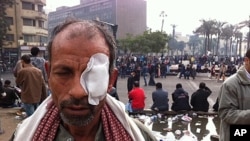An official of the U.S.-based group Human Rights Watch (HRW) says Egyptians are expressing anger and frustration at the military over the use of “excessive” force to prevent anti-government protests.
Medics say a police and army assault on anti-government protesters in Cairo has killed at least three people, raising the death toll in Egypt to at least five killed in two days of unrest.
Heba Fatma Morayef, a HRW researcher on Egypt, says there are concerns the military administration has yet to investigate security officials accused of committing human rights violations during the protests that ousted long-time leader Hosni Mubarak.
“The anger against the military has definitely grown, but at the same time just in terms of the media reaction, there has been support by the independent media,” said Morayef. “A lot of people see this violence and worry about what this means for the future. A lot of people who don’t want to see the elections postponed in any way and many others were fearful about the general sense of insecurity…in the country.”
Police on Sunday fired tear gas for a second day at thousands of anti-government protesters trying to re-establish a protest camp in Cairo's Tahrir Square in an effort to put pressure on military rulers for quicker democratic reforms.
“We’ve been monitoring the military police and the Central Security Forces’ policing of demonstrations from the beginning. And as early as February 21, the military police and Central Security Forces were using excessive force to break up and disperse protesters,” said Morayef. “On a number of occasions we have seen them using teargas at close range, indiscriminately being fired, which resulted in injuries and at times, even death.”
Despite the crackdown, several thousand anti-government protesters managed to remain in control of the square, some camping out in tents and others blocking traffic.
More anti-government activists tried to march toward the site, but police pushed them back.
Analysts have condemned the violence and demanded an investigation and punishment for those alleged to have violated human rights of unarmed protesters.
“People are still very angry at the military. They see this as accumulation of the past few months where [there have been] increasing military abuses of against peaceful protesters,” said Morayef. “All of these incidents of human rights violations by the military have so far gone uninvestigated. And this is one of the key demands and concerns that protesters have and that are fueling their anger.”




